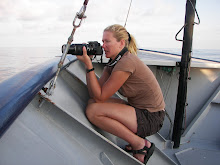This summer has nearly been my busiest yet, despite not having to sample for the first time in 4 years! I have realized that living on Long Island is one of the best places to conduct marine science, or to savor a passion in marine science. Long Island is the land of opportunity for young, budding marine scientists. With its proximity to New York City and a thriving economy and population of its own, Long Island offers what some other marine metropolises can't - opportunity! Having gone to school in Maine for my undergraduate degree, I learned very quickly that what Maine made up for in beauty, it lacked in prospect. Opportunities for research and internships were few and far between, and while this may have changed in the years since I graduated, there is no doubt that Long Island is ripe for marine science possibility. Take for example, the Riverhead Foundation for Marine Research and Preservation. Located just behind Atlantis Marine World aquarium, the Riverhead Foundation is New York state's only sea turtle and marine mammal stranding program. Devote some time and energy with this great organization and you will be working hands-on with sea turtles, seals, and the occasional dolphin or porpoise, or perhaps conducting necropsies on whales that have washed ashore.
Long Island is of course, an ISLAND, and we are literally surrounded by water, something made easy to forget by our expansive bridges and ferry systems. With all that surrounding water comes beach, and opportunities to monitor horseshoe crabs and diamondback terrapins with the DEC, or count returning alewives and seine for tropical fish (brought to Long Island by the warm Gulf Stream) with Seatuck Environmental Association. You can catch a seal cruise in the winter out of Freeport with the Riverhead Foundation or catch a whale watch out of Montauk aboard the Viking Fleet in association with CRESLI (Coastal Research and Education Society of Long Island). There's the Blue Ocean Institute founded by local author and conservationist Carl Safina and for those of you willing to get more than your feet wet, there's Long Island Diver's Association (LIDA). Stony Brook University now offers a marine science undergraduate program (something not available to me while I was going to college) and Suffolk County Community College teaches marine biology, oceanography and many other environmental and biological courses to get you on the path to higher knowledge about our local marine ecosystems.
This summer, I had the privilege of working with many of these fine institutions, and I realized that in fact, I could have done much more. For there is so much to be done and so much manpower needed to do it. Many people simply don't realize the opportunity that exists on Long Island. While much of it is voluntary, the rewards are great! If you share an interest in any aspect of marine science, I encourage you to contact the organizations I have mentioned and pursue your dreams. You will be helping our fragile marine environment, while gaining valuable insight, experience, and the gift of doing what you love. :)



.jpg)




